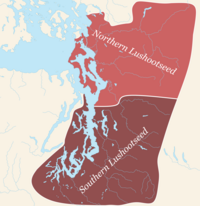CDP in Washington, United States
| Nisqually Reservation, Washington | |
|---|---|
| CDP | |
 Location of Nisqually Reservation, Washington Location of Nisqually Reservation, Washington | |
| Coordinates: 47°0′22″N 122°40′11″W / 47.00611°N 122.66972°W / 47.00611; -122.66972 | |
| Country | United States |
| State | Washington |
| County | Thurston |
| Area | |
| • Total | 2.7 sq mi (7.1 km) |
| • Land | 2.7 sq mi (7.0 km) |
| • Water | 0.0 sq mi (0.0 km) |
| Population | |
| • Total | 668 |
| • Density | 216.5/sq mi (83.6/km) |
| Time zone | UTC-8 (Pacific (PST)) |
| • Summer (DST) | UTC-7 (PDT) |
| ZIP code | 98513 |
| Area code(s) | 360, 564 |
| FIPS code | 53-49193 |
| GNIS feature ID | 1528422 |
The Nisqually Reservation, also known as Nisqually Indian Reservation is a federally recognized Indian reservation in Thurston County, Washington, United States. The population was 668 at the 2020 census.
History
Nisqually Indian Reservation was formed in 1854 after the signing of the Treaty of Medicine Creek. The portion northeast of the Nisqually River, totaling 3,353 acres (1,357 ha), was condemned in 1918 by Pierce County for use by the U.S. Army during the establishment of Fort Lewis. The Nisqually Tribe was compensated $75,840 by an Indian Board; an additional $65,000 was appropriated by the federal government in 1921 to landowners in recognition of the "unfair payment".
Geography
The Nisqually Reservation is located at 47°0′22″N 122°40′11″W / 47.00611°N 122.66972°W / 47.00611; -122.66972 (47.006162, -122.669733).
According to the United States Census Bureau, the Nisqually Indian Community CDP (census-designated place, as the reservation is title for census purposes, has a total area of 2.7 square miles (7.1 km), of which, 2.7 square miles (7.0 km) of it is land and 0.37% is water.
Demographics
| Census | Pop. | Note | %± |
|---|---|---|---|
| 1990 | 558 | — | |
| 2000 | 588 | 5.4% | |
| 2010 | 575 | −2.2% | |
| 2020 | 668 | 16.2% | |
| U.S. Decennial Census 2020 Census | |||
As of the census of 2000, there were 588 people, 173 households, and 149 families residing in the CDP. The population density was 216.5 people per square mile (83.5/km). There were 178 housing units at an average density of 65.5/sq mi (25.3/km). The racial makeup of the CDP was 26.70% White, 1.36% African American, 60.71% Native American, 0.68% Asian, 1.36% Pacific Islander, 0.85% from other races, and 8.33% from two or more races. Hispanic or Latino of any race were 5.61% of the population.
There were 173 households, out of which 45.1% had children under the age of 18 living with them, 50.3% were married couples living together, 23.7% had a female householder with no husband present, and 13.3% were non-families. 9.2% of all households were made up of individuals, and 2.3% had someone living alone who was 65 years of age or older. The average household size was 3.40 and the average family size was 3.50.
In the CDP, the age distribution of the population shows 36.6% under the age of 18, 12.4% from 18 to 24, 25.5% from 25 to 44, 20.6% from 45 to 64, and 4.9% who were 65 years of age or older. The median age was 26 years. For every 100 females, there were 87.3 males. For every 100 females age 18 and over, there were 92.3 males.
The median income for a household in the CDP was $35,000, and the median income for a family was $38,750. Males had a median income of $34,250 versus $25,096 for females. The per capita income for the CDP was $14,094. About 13.7% of families and 18.2% of the population were below the poverty line, including 18.4% of those under age 18 and 26.1% of those age 65 or over.
Education
The census-designated place is divided between North Thurston Public Schools and Yelm Community Schools.
See also
Notes
- ^ "2020 Census Redistricting Data (Public Law 94-171) Summary File". American FactFinder. United States Census Bureau. Retrieved May 15, 2022.
- ^ "U.S. Census website". United States Census Bureau. Retrieved January 31, 2008.
- "US Board on Geographic Names". United States Geological Survey. October 25, 2007. Retrieved January 31, 2008.
- U.S. Geological Survey Geographic Names Information System: Nisqually Reservation
- GNIS citation for alternate name
- "Thurston County Place Names: A Heritage Guide" (PDF). Thurston County Historical Commission. 1992. p. 58. Retrieved March 28, 2018.
- Denfeld, Duane Colt (January 16, 2008). "Fort Lewis, Part 1: 1917-1927". HistoryLink. Retrieved January 8, 2024.
- "US Gazetteer files: 2010, 2000, and 1990". United States Census Bureau. February 12, 2011. Retrieved April 23, 2011.
- U.S. Geological Survey Geographic Names Information System: Nisqually Reservation
- "CENSUS OF POPULATION AND HOUSING (1790-2000)". Census.gov. Retrieved July 31, 2010.
- "2020 CENSUS - SCHOOL DISTRICT REFERENCE MAP: Thurston County, WA" (PDF). United States Census Bureau. Archived (PDF) from the original on October 9, 2022. Retrieved March 13, 2024. - Text list
| Lushootseed-speaking peoples of Puget Sound | ||||||
|---|---|---|---|---|---|---|
| Lushootseed language |
|  | ||||
| Culture |
| |||||
| Peoples |
| |||||
| Federally recognized tribes | ||||||
| Reservations | ||||||
| Non-recognized groups | ||||||
| Municipalities and communities of Thurston County, Washington, United States | ||
|---|---|---|
| County seat: Olympia | ||
| Cities |  | |
| Town | ||
| CDPs | ||
| Unincorporated communities | ||
| Indian reservation | ||
| Ghost town | ||
| Footnotes | ‡This populated place also has portions in an adjacent county or counties | |